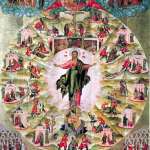
The philosopher Immanuel Kant thought that religion could be and should be reduced to ethics. For Kant and the philosophers of the enlightenment, the value of religion was limited to the virtues it inculcated.
In this article, the third paper in a series on sin and virtue, I will discuss what the Catholic Church has categorized as the theological and cardinal virtues. Previously, I had endeavored to examine the seven deadly sins and the seven heavenly virtues.
I will begin by distinguishing between the theological and cardinal virtues and providing some foundational information before discussing each of the virtues.
The Theological Virtues
An Aristotelian definition of virtue would be that virtue is a state of one’s character that allows one to act appropriately in accord with reason. Such a definition is certainly applicable to a secular understanding of virtue and is even valuable in understanding what Catholicism calls the cardinal virtues (see below). However, the Catholic tradition has also identified three theological virtues: faith, hope, and charity.
They are called theological because they are not natural to human nature. Rather, these three virtues are infused onto the soul by God. Faith, hope, and charity are virtues that allow human beings to participate in the divine life.
The Theological Virtues
Faith is the theological virtue by which we believe in God and all that he has said and revealed to us. Faith also extends to the Catholic Church that God founded. By faith, “man freely commits his entire self to God.” For this reason, the believer seeks to know and do God’s will. (See Catechism of the Catholic Church, paragraph 1814).
Hope is the theological virtue by which we desire the Kingdom of Heaven and eternal life as our happiness. Hope means placing our trust in Christ’s promises and relying not on our strength but on the grace the Holy Spirit gives. “The Holy Spirit has poured out upon us richly through Jesus Christ our Savior so that we might be justified by his grace and become heirs in the hope of eternal life.” (Catechism of the Catholic Church, paragraph 1818).
The virtue of hope responds to the aspiration for happiness that God has placed in the human heart. Hope inspires men’s activities and purifies them so as to order them to the Kingdom of Heaven while at the same time acting as a deterrent to discouragement. Hope sustains us during times of difficulty and abandonment by opening up the heart in expectation of eternal beatitude. Lifted and inspired by hope, we are preserved from selfishness and led to the happiness that flows from charity.
Charity is the theological virtue by which we love God above all things for His own sake and our neighbor as ourselves. (Catechism of the Catholic Church, paragraph 1823).
Charity is the cornerstone of the new covenant. Indeed, Jesus suggests that charity is a divine imperative, “I give you a new commandment: love one another. As I have loved you, so you also should love one another.” (John 13:34).
By loving his own to the end, Jesus makes manifest the Father’s love which he receives. We are to imitate the love of Jesus that we have received. For this reason, Jesus says: “As the Father has loved me, so have I loved you; abide in my love.” (John 15:9).
Cardinal Virtues
Where the theological virtues are of supernatural origin in that they are infused into the soul by grace, the cardinal virtues are human virtues acquired by education and habituation. The word cardinal comes from the Latin word cardo, meaning “that on which other things depend.” Put differently, the cardinal virtues are the foundation for the moral life. They are prudence, justice, fortitude, and temperance.
Prudence is that virtue by which we discern the correct action in any given situation. To prevent an impulsive decision, a prudent person will take the time to consider all possible options and their outcomes. In addition, prudence dictates that we pray for guidance while also seeking counsel from others.
In a sense, prudence helps guard against our fallen nature leading us to act improperly or imprudently. As Catholics, we recognize our damaged nature and therefore rely upon the Church and Scripture to aid us in our actions. Doing so will help us to form our conscience according to God’s will, enabling our prudent discernment to become more reliable.
Justice is the virtue of giving God and your neighbor what is rightly their due. One does God justice by correctly ordering their life to Him and properly worshipping God.
Being just to our neighbors is predicated on acknowledging that everyone is made in the image of God. By the very nature of this fact alone, practicing the virtue of justice means treating everyone with dignity and respect. Such treatment does not, of course, negate the need for society to punish evil appropriately.
Justice, therefore, is a moral virtue that consists of the constant and firm will to give what is owed to God and neighbor. Justice toward God is called religion. Justice toward men disposes one to respect the rights of each and to establish harmony in human relationships that promotes equity concerning persons and the common good. (See Catechism of the Catholic Church, Paragraph 1807).
Fortitude is the virtue by which we remain steadfast in our Catholic faith. To be sure, being Catholic (or a person of faith, in general) is increasingly difficult in an ever-increasing secular world.
Fortitude involves both the courage to live out one’s faith and the resilience to suffer for one’s beliefs. As in all of the virtues, we are strengthened in fortitude by partaking in the sacramental life – particularly in regular reception of the Eucharist and Reconciliation. The sacraments are how God delivers His grace to us, and it is grace that makes virtue possible.
Temperance. For Aristotle, temperance was the mean between two extremes. For example, courage was the right balance between cowardice and rashness.
Therefore, temperance is that virtue by which we find balance in our appetites and passions and where we practice moderation in our use of created goods and our conduct with people. The practice of temperance enables us to avoid misusing things or even other people to satisfy our selfish desires, which are not of God. Instead, it helps us to put others before ourselves.
Moreover, temperance requires a self-mastery of the will so as to subordinate our baser instincts to the rational soul. Likewise, temperance also calls for us to tend to our physical and spiritual well-being.
Conclusion
For the Catholic, virtue is that set of traits, whether infused upon the soul by God or whether learned and developed, that aids in conforming one’s life to the will of God. As such, virtue acts in direct opposition to sin, which are actions that violate God’s law.
In this series of articles, I have sought to explain the seven deadly sins (so-called for they place the soul in mortal danger) and the heavenly virtues that are intended to contradict the deadly sins. I have also examined the three theological virtues (divinely infused virtues) and the four cardinal virtues that are the foundation of moral life.












